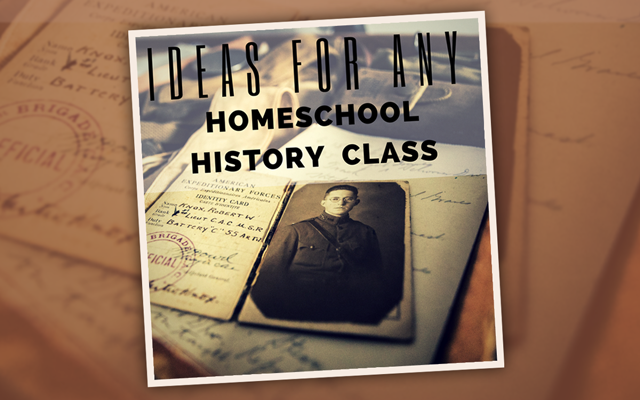Ideas for Any Homeschool History Class


History.
Woo-hoo!
I love the subject. Even though my major in college was Early Childhood Education, all my electives were historical in nature.
‘Cause every kindergartner needs to know about the Revolutionary War.
I’m always surprised when I come across folks who shudder when recalling their own experiences with history in school. I am a product of a public education, but I had some great history teachers.
For one, they loved the subject, and it showed through their talks.
I think the biggest mistake many homeschool families make, when they tackle history, is that they go about it all the wrong way. Even if you purchase the best history curriculum in the whole wide world…it won’t make you love history.
History isn’t a set of facts, figures and dates.
History is just a bunch of stories about people. Our people.
Children, by nature, are curious. Memorizing dates and labeling maps isn’t going get their brains firing.
There is some of that, of course. We need to know when Columbus sailed the “ocean blue,” and when the Declaration of Independence was signed. You also need to have a good recipe for a salt dough map, and know all about tea staining.
Below is a list of general ideas that you can add to almost any history study. Just enough to “whet yer whistle.”
See if you can find primary resources to use with your study
Primary sources are documents, letters, accounts, descriptions, photographs or drawings of events created as close to the event as possible. It might be a copy of the Constitution or the official White House picture of Teddy Roosevelt. For example, here you can find a picture of the Lincoln Family Bible. In my studies, I have found letters from soldiers to family at home, recently declassified government communications, and more!
Read Historical Fiction and Biographies
It’s the stories that make the difference. I always try to find books to read, along with any study we might be doing. Sometimes, your history curriculum will provide suggestions. However, the best resources are always your librarians and homeschool friends. They always know the best
books. I am also a great fan of audio books. In fact, I am a GREAT fan of audio books. They are my secret weapon.
Videos/Documentaries/Movies
I love using video and movie elements in our history classes. One of the first things I do, when we begin studying a new event or time period, is start looking through my Netflix and Amazon Prime site. I look for any movies or commentaries that might be just the right fit. I dig a little bit on Youtube for speeches, and/or documentaries and make a playlist. I have found so many wonderful resources for FREE. Don’t discount the library! Just be sure to plan in advance. Homeschoolers everywhere know about the library.
Lots of Hands-On Projects!
These can include handmade weaponry or costumes. You can recreate the artwork of the time or make recipes. My son even created his own Christopher Columbus movie, one year. He designed his own scenery from Legos and scraps of fabric from my fabric supplies. His characters were made up of army men, action figures, and the odd football figurine. I think Indiana Jones even made an appearance. History buffs can even create their own Jeopardy games or documentaries.
Of course, timeline projects are always a good idea for studying history. They give students a better grasp of an event’s place in history.
And make those salt dough maps! Learn topography. Plot out major historical battles and build the Mayflower out of Popsicle sticks. It wouldn’t be the first time.
Personal Interviews and Stories
If you study a more current time period, your kids can interview those who have lived it. There is nothing more powerful than hearing from those who can remember a particular event in history. Some local historical societies will often hold talks and lectures about different topics. These are often great events to take your family to. It’s hearing about history that happened in your backyard! It also helps put those historical events in perspective. Often, we hear history from the perspective of a political ideology or from today’s current climate, not from how things really were.
My son, who is now a junior, is going to be doing personal interviews with several people in our church this year who are in their 80’s and 90’s. What stories they can tell!
Take it on the Road
We love a good field trip. Even if I know that a particular exhibit is coming to a local museum, but we won’t be studying that time period for a few more months, we will still go. You can’t time everything just right. In particular, the fall months seem great for festivals and historical celebrations. Start marking them on your calendar. I’ve also found that virtual field trips or literary field trips can be fun.
So, there you have it, my friends. Just a few ideas that, hopefully, will spark a few more ideas for your homeschool history lessons.
Rebekah Teague is the homeschooling mama to one busy and beautiful boy. She is married to The Muffin who is a pastor and a really great guy. In her spare time she can be found with a book and a cup of tea. She blogs at There Will Be A $5 Charge For Whining














































